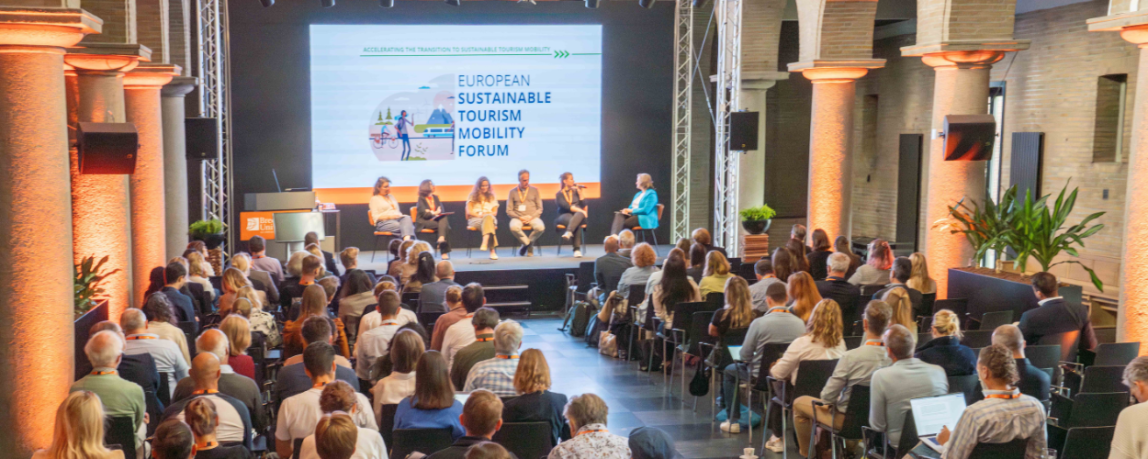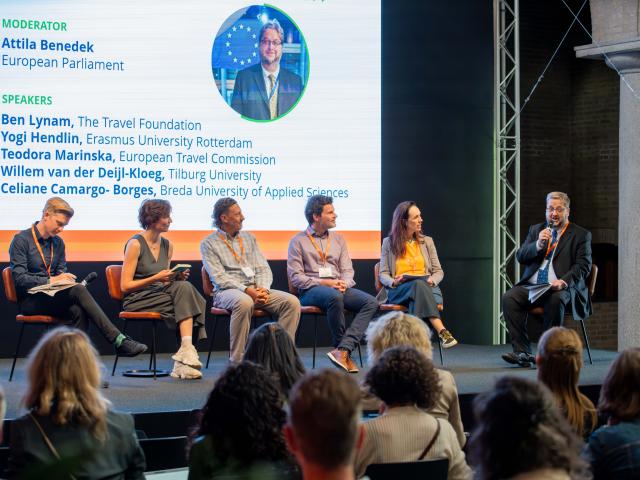
Alternative futures for tourism mobility
05/27/2025 - 11:25
- Expertise
- Industry
- News
The forum was organised by the Centre for Sustainability, Tourism and Transport (CSTT) from BUas and hosted bij Nina Nesterova, in collaboration with the Dutch Ministry of Infrastructure and Water Management, the Ministry of Economic Affairs, and the Netherlands Board of Tourism and Conventions (NBTC).
Attila Benedek (Senior Policy Advisor Tourism and Transport, European Parliament) opened the day with a speech focusing on the importance of the tourism and transport collaboration and this conversation taking place on behalf of Daniel Attard (member of the European Parliament of the Committee on Transport and Tourism). The programme continued with Ben Lynam from The Travel Foundation and Camille Mutrelle from Transport & Environment, sharing the latest trends and developments in tourism and transport.
Only two reliable macro-trends for tourism
Ben looked back at 2009, the year Myspace was overtaken by Facebook, and AirBed & Breakfast changed its name to Airbnb. In this year, The Travel Foundation published a future-gazing report called Tourism 2023. The report predicted that by 2023 we’d have: car-planes as emerging tech, breakthroughs in algae-based fuels, personal carbon credits, and a carbon price so high only the elite could afford to fly. Some of these ideas still feel futuristic. But what’s striking is how over-optimistic the report was about technology and global policy shifts. The only two reliable macro-trends for tourism are: climate change and tourism growth.
The road to a zero-emission mobility system
Camille focused on the Road to a zero-emission mobility system and concluded her presentation with the statement that technological solutions (electric vehicles and cleaner fuels) are crucial but that they’re not a license to grow for the transport and tourism sector. “We must also shift to sustainable modes. Closer, slower, and more sustainable tourism is possible.”
Alternative futures for tourism mobility
The opening panel, moderated by Anouk van Eekelen (NBTC), brought together key voices from tourism boards, transport organisations, and regional authorities to discuss the challenges and opportunities in sustainable tourism mobility. Panelists highlighted national initiatives like Austria's Klimaticket and France’s push to replace short-haul flights with rail, alongside the potential of buses and nature-based tourism to lower emissions.
However, persistent obstacles, such as dominant car use, slow rail uptake, limited cross-sector collaboration, and infrastructure gaps, continue to hinder progress. The panel concluded that while technology and policy are advancing, real transformation requires deeper collaboration, targeted investment, and systemic changes in infrastructure, mobility systems, and travel behaviour.
During two rounds of five interactive sessions, participants engaged in discussions on alternative future scenarios and shared their insights and strategies.
In a concluding session, the day’s insights were brought together. The forum offered a rich, multi-perspective dialogue on the systemic transformation needed for sustainable tourism mobility. Speakers emphasised that technological solutions alone are insufficient Achieving meaningful change will require reimagining existing frameworks, fostering cross-sector collaboration, addressing policy barriers, and embedding ethical considerations into travel behaviour and business models.

Some key takeaways include:
- Reimagining tourism mobility requires systemic thinking: Behaviour change should be viewed within broader systemic contexts, focusing not only on solutions but on envisioning alternative futures that shift the entire tourism and mobility system toward equity and low-carbon travel.
- Cross-sector cooperation is essential: Collaboration between tourism and transport sectors can unlock innovative solutions by integrating technical, behavioural, and marketing approaches, enabling systemic change and long-term adaptation.
- Climate risks require systemic and equitable adaptation
Climate risks demand a fundamental rethinking of tourism and mobility systems, recognizing that some destinations may face limits to continued viability. Long-term, coordinated policies are needed to ensure an equitable transition, balancing climate adaptation, infrastructure resilience, and reduced travel where necessary.
- Establish honest communication about technological solutions and barriers
Policies should mandate transparent communication about the realistic potential and limitations of emerging technologies (e.g. SAFs, electric aviation). Avoiding overreliance on future solutions ensures timely action, builds public trust, and supports informed, responsible decision-making.
- Data sharing and governance are critical enablers: Real-time data platforms can improve visitor management and travel experiences. They require clear public policy frameworks to ensure data security, equitable access, and coordinated decision-making across sectors.
- Ethical considerations must guide travel choices and policy: Reducing unnecessary travel, particularly air travel, is a shared ethical responsibility. Governments, tourism industry and travellers all play a role in supporting responsible and just mobility models.
Finally, keynote speaker Koert van Mensvoort from Next Nature challenged participants to think beyond traditional frameworks by sharing his vision for the future of travel and transport.
The forum underscored the importance of collaboration and knowledge sharing to accelerate the transition to sustainable tourism mobility.